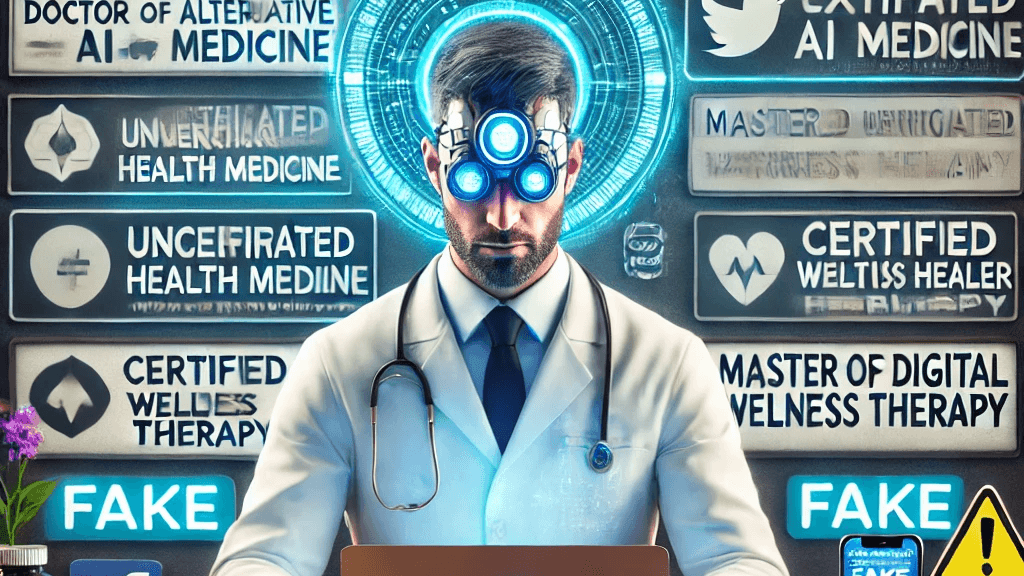Digital Quackery: The Rise of Social Media Influencers as Modern-Day Medical Frauds (Digital Quacks)
by Dr. Rajendra Pratap Gupta
4 min read • February 27, 2025

( The word ‘Digital Quackery’ is being used for the first time in healthcare lexicon in this article- this will take time for acceptance )
For centuries, quacks have preyed on the ignorant and vulnerable, particularly in rural and underserved areas where access to qualified medical professionals is scarce. These traditional quacks—untrained individuals posing as doctors—have long peddled dubious treatments, herbal concoctions, and miracle cures, exploiting the desperation of patients who lack alternatives. However, the landscape of medical fraud has evolved. Today, quacks no longer operate solely in remote villages and urban slums; they have gone digital, wielding the power of social media to reach millions. These ‘digital quacks’ pose an even greater threat than their predecessors, leveraging well-designed videos, professional branding, and enormous online followings to mislead and defraud people at an unprecedented scale.
Who Are the New-Age Digital Quacks?
Unlike the traditional quacks of the past, who operated in secrecy or within small communities, digital quacks enjoy public visibility. Many pose as health coaches, wellness experts, or alternative medicine practitioners, often without any formal medical training. They exploit social media platforms—YouTube, Instagram, TikTok, and Facebook—to promote unverified treatments, exaggerated health claims, and even dangerous medical misinformation.
These influencers build credibility through sophisticated marketing strategies, using:
- Professional video production: High-quality visuals, animations, and persuasive storytelling make their content seem legitimate.
- Emotional manipulation: They exploit fear and anxiety about mainstream healthcare, pushing ‘natural’ or ‘ancient’ remedies as superior alternatives.
- Pseudoscience: They misuse scientific jargon to lend credibility to their claims, often cherry-picking studies or distorting facts.
- Testimonials and virality: Fake success stories and user testimonials amplify their influence, creating a false sense of authenticity.
While traditional quacks might deceive a few hundred people in their lifetime, digital quacks can mislead millions in a matter of weeks. From promoting dangerous diet plans and unapproved supplements to encouraging vaccine hesitancy and COVID-19 misinformation, their influence can have devastating consequences.

The Dangers of Digital Quackery
- Widespread Misinformation: False medical advice spreads rapidly, making it difficult for people to discern reliable sources from fraudulent ones.
- Financial Exploitation: Followers are persuaded to buy expensive but ineffective supplements, wellness programs, or alternative treatments.
- Health Risks: People may delay or abandon necessary medical treatment in favor of unproven remedies, worsening their conditions.
- Erosion of Trust in Healthcare: By painting doctors and pharmaceutical companies as villains, digital quacks undermine faith in legitimate medicine.
How to Stop Digital Quackery
1. Stricter Regulations and Enforcement
Governments and medical boards must actively monitor and regulate health-related content on social media. Platforms should be required to flag or remove misinformation and penalize repeat offenders.
2. Fact-Checking and Public Awareness
Initiatives to educate the public on identifying misinformation are essential. Fact-checking organizations and digital literacy programs should be promoted to counteract pseudoscience.
3. Collaboration Between Medical Experts and Tech Platforms
Social media companies should work with health professionals to verify medical claims and ensure misleading content does not gain traction. The International Patients Union ( www.patientsunion.org ) is a platform that is trying to help people find verified information on the web with regards to health , and there are many such platforms
4. Encouraging Ethical Digital Health Communication
Qualified medical professionals must take a more active role in digital spaces, producing accurate, evidence-based content that counters misinformation.
5. Reporting and Legal Action
Users must be encouraged to report fraudulent medical content. Legal action should be pursued against individuals who knowingly spread false and harmful medical advice.
Digital quackery is a growing menace, far more dangerous than traditional quackery due to its vast reach and sophisticated presentation. While social media has democratized information, it has also given rise to a new breed of medical fraudsters who exploit the unsuspecting masses. By taking collective action—through education, regulation, and ethical digital health communication—we can combat this epidemic of misinformation and safeguard public health in the digital age.
Let’s work together and be tougher on healthcare / medical misinformation
Dr. Rajendra Pratap Gupta, PhD
Founder
International Patients' Union
E: office@patientsunion.org
Phone: +91-9911100665
#DigitalQuackery #quacks #healthcare #fakedoctors #fakemedicine #fakedrugs #substandard #drugs #addiction
World Health Organization Pan American Health Organization Africa CDC Centers for Disease Control and Prevention Health Parliament International Patients’ Union